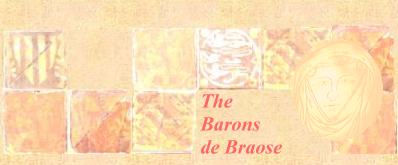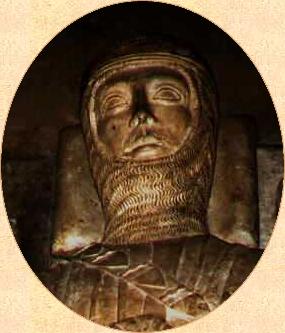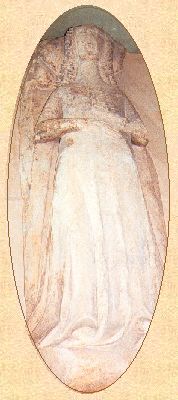
Revenge

The king's chancellor received
a report on William's death. It said: "At that manor which
is called Crokein he was made to croak. He was hanged from a
certain tree and not secretly or by night but openly and in broad
daylight in front of eight hundred people and more, called together
to view this pitiable and woeful spectacle, and especially those
to whom William de Braose senior and his sons were hostile by
reason of injury inflicted on their ancestors whether recent
or otherwise."
Men
shouted out: "Now the Welsh blood which William de Braose
and his own spilled on the ground has been avenged". The
blood feud dating back to Seisyll ap Dyfnwal's death in 1175
was still seething.
Llywelyn wrote to Eva de
Braose and her powerful brother William Marshal. He warned Eva that he could not restrain his
men because of the scandal and outrage. Lest any worse harm might
happen, would she still be willing for the marriage of Dafydd
and Isabel to proceed? The little girl was apparently at his
court, his son wanted Builth and his men were in the mood to
take it, and more, if the betrothal was not honoured. Amid this
appalling hostility, the marriage of Dafydd and Isabel went ahead.
Llywelyn's letter to William
Marshal, his "friend and dearest brother", said: "Your
grace will know that the magnates of our land might in no way
control what they will do regarding William de Braose, in view
of the judgement which they will have made as to how he engineered
our deceit by entering our chamber, bringing shame to us in the
highest way. Whereby we ask your grace resolutely, concerning
which we show the greatest trust, in so far as you may wish to
show to us your will, whether you might have wished the alliance
made between your niece and our son David, which if you might
have wished it, on our part that alliance steadfastly and persistently
stands firm."
 Henry
III, William Marshall and an English army were just embarking
for Poitou. There was little inclination to react to Welsh aggression.
William's death created opportunities for ambitious men, particularly
as his lands would be divided between four heiresses. At first
Eva de Braose's brother William Marshal had custody of the lands
while the inheritances were under review, but in 1231 he died.
Hubert de Burgh, the king's opportunist justiciar, seized the
advantage. He held the territories until Llywelyn rose up and
prompted de Burgh's fall in 1232.
Henry
III, William Marshall and an English army were just embarking
for Poitou. There was little inclination to react to Welsh aggression.
William's death created opportunities for ambitious men, particularly
as his lands would be divided between four heiresses. At first
Eva de Braose's brother William Marshal had custody of the lands
while the inheritances were under review, but in 1231 he died.
Hubert de Burgh, the king's opportunist justiciar, seized the
advantage. He held the territories until Llywelyn rose up and
prompted de Burgh's fall in 1232.
Llywelyn's
ascendancy in his last years owed much to a brief alliance with
Richard Marshal, Eva's younger brother. Richard inherited fantastic
wealth and power. His hostility to Henry III had major repercussions
and Llywelyn benefited from a peace treaty negotiated with the
king at this time. As always, Llywelyn took advantage of English
disunity. Richard died in Ireland in 1234 and the king was suspected
of treachery.
Eva gained custody of Hay
castle as part of her dower. She also held Totnes until
her death in 1246. Eva's
tomb is at Abergavenny
Priory Church. (20.1) Gilbert Marshal finally
acquired the role of distributing the de Braose lands to the
heiresses on behalf of the king's brother, Richard of Cornwall.
The contentious issue of Dafydd and Isabella's portion delayed
matters until after the death of both Llywelyn and his son.

back
to text

back to text
 Revenge |
||||
The king's chancellor received a report on William's death. It said: "At that manor which is called Crokein he was made to croak. He was hanged from a certain tree and not secretly or by night but openly and in broad daylight in front of eight hundred people and more, called together to view this pitiable and woeful spectacle, and especially those to whom William de Braose senior and his sons were hostile by reason of injury inflicted on their ancestors whether recent or otherwise." Men shouted out: "Now the Welsh blood which William de Braose and his own spilled on the ground has been avenged". The blood feud dating back to Seisyll ap Dyfnwal's death in 1175 was still seething. Llywelyn wrote to Eva de Braose and her powerful brother William Marshal. He warned Eva that he could not restrain his men because of the scandal and outrage. Lest any worse harm might happen, would she still be willing for the marriage of Dafydd and Isabel to proceed? The little girl was apparently at his court, his son wanted Builth and his men were in the mood to take it, and more, if the betrothal was not honoured. Amid this appalling hostility, the marriage of Dafydd and Isabel went ahead. Llywelyn's letter to William Marshal, his "friend and dearest brother", said: "Your grace will know that the magnates of our land might in no way control what they will do regarding William de Braose, in view of the judgement which they will have made as to how he engineered our deceit by entering our chamber, bringing shame to us in the highest way. Whereby we ask your grace resolutely, concerning which we show the greatest trust, in so far as you may wish to show to us your will, whether you might have wished the alliance made between your niece and our son David, which if you might have wished it, on our part that alliance steadfastly and persistently stands firm."
Llywelyn's ascendancy in his last years owed much to a brief alliance with Richard Marshal, Eva's younger brother. Richard inherited fantastic wealth and power. His hostility to Henry III had major repercussions and Llywelyn benefited from a peace treaty negotiated with the king at this time. As always, Llywelyn took advantage of English disunity. Richard died in Ireland in 1234 and the king was suspected of treachery. Eva gained custody of Hay
castle as part of her dower. She also held Totnes until
her death in 1246. Eva's
tomb is at Abergavenny
Priory Church. (20.1) Gilbert Marshal finally
acquired the role of distributing the de Braose lands to the
heiresses on behalf of the king's brother, Richard of Cornwall.
The contentious issue of Dafydd and Isabella's portion delayed
matters until after the death of both Llywelyn and his son.
|
||||